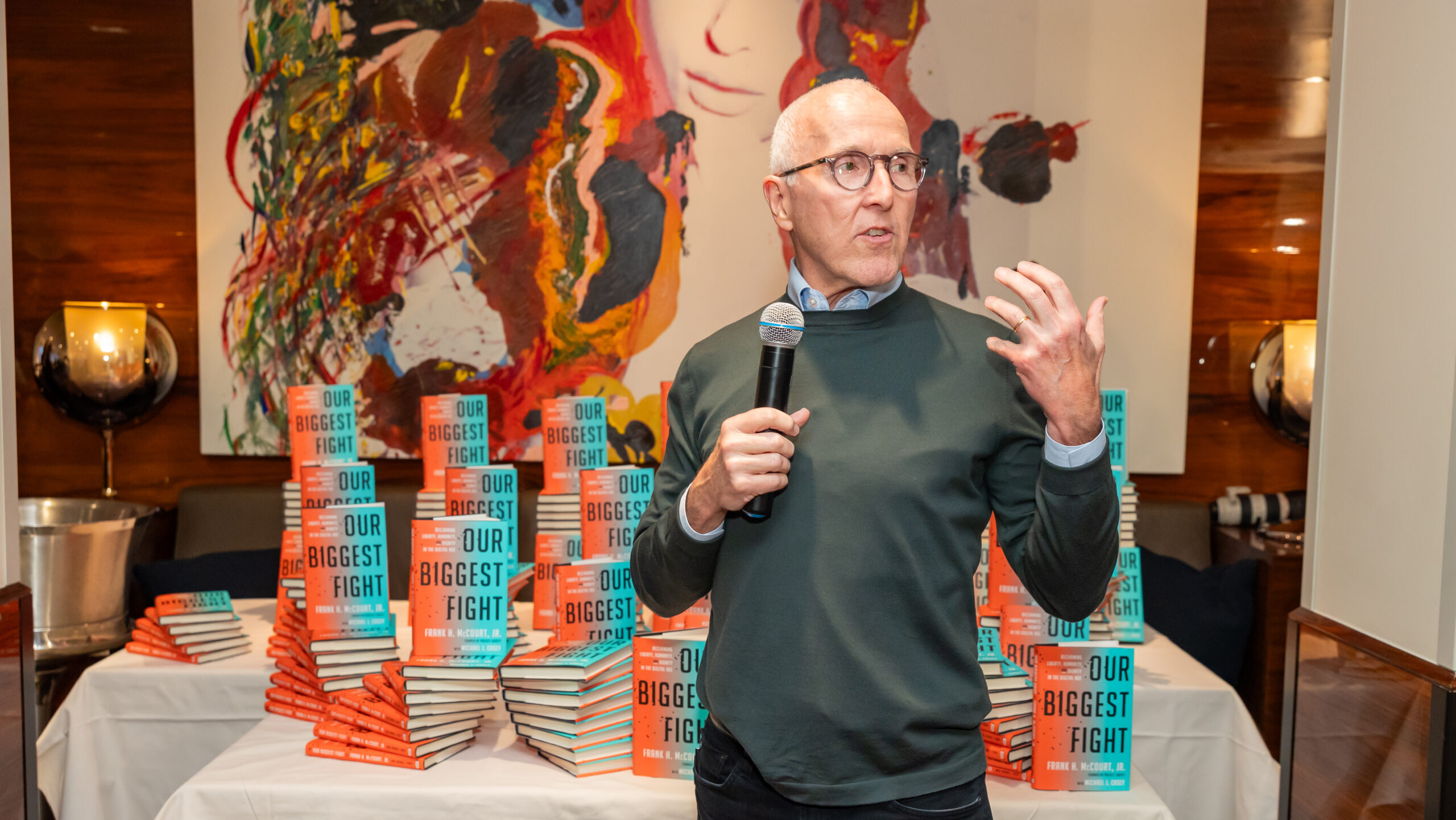The Boston-born magnate and former L.A. Dodgers owner is engaged in the fight of his life: reining in big tech.
Billionaire Frank McCourt Jr. is mad. Really mad. And he’s not going to take it anymore. The subject of his ire? Other billionaires—specifically the ones behind tech companies that co-opt and exploit their customers’ data, sometimes even using it against them. Best known as the scion of a Boston-based construction giant that helped build modern Boston, the McCourt Global founder and one-time L.A. Dodgers owner is now engaged in the fight of his life: reining in big tech. The 70-year-old magnate has launched an initiative called Project Liberty, written a book that serves as a call to arms, and is putting his money where his mouth is, assembling a high-profile bid to buy the social media platform TikTok. He recently talked to us about his plan to redesign the Internet and preserve our personal liberties, developing the Seaport, and, yes, his infamously ugly divorce.
Your book, OUR BIGGEST FIGHT, is fascinating, but what makes a successful construction guy an authority on the Internet?
The point here is not to be right, it’s to get this right. It’s to fix what’s pretty obviously broken.
So what needs to be fixed?
The Internet has been co-opted by a few large platforms, and when I refer to “big tech,” that’s shorthand for that. So please understand, I’m not against technology, and there’s lots of technology that works well. What I’m focused on here is the harm being caused by the current architecture of the Internet and, more specifically, how we’re all having our data, our personhood, stripped from us. It’s being aggregated by these big platforms, and Project Liberty is intended to re-imagine how the Internet works. It’s why I wrote the book—not just to highlight the problem but to put forward a solution, a methodology, or a theory for change and for moving forward and reclaiming our lives.
Do you think the problem is getting worse?
I do think the harms are becoming more and more obvious. And by harms, you can take your pick. We’re barely governable. Social media and misinformation and disinformation are undermining democracy. The fabric of our society is being ripped apart. And perhaps most important, and most sadly, it’s harming children. There’s a lot of research indicating that young people are more anxious and more depressed than ever. More thoughts of suicide and, tragically, more young people taking their own lives. And a large part of that can be attributed to social media. So there’s clearly an urgency, and the CEOs of these big tech platforms are not doing anything about it.
Can you pinpoint the exact time when you realized that the Internet had become your Public Enemy Number One?
It was a process. After selling the Dodgers, I helped start a public-policy school at Georgetown University, and at that point in time, I had in mind that perhaps big data could be used in a positive way and that we could get ahead of the problem. But I learned very quickly that big tech moves much too fast for our policymaking apparatus to keep up with it. It became clear to me that this whole thing is upside down, that we all create the data, and we should decide who gets to use it and for what purpose. It’s not Twitter’s data, Facebook’s data, TikTok’s data, Google’s data, or Amazon’s data. It’s our data, our personhood, and we should own it and have agency over it.
Can you compare it to anything else?
If I were the head of the Postal Service and I told you I was going to deliver your mail for free, you might say, “What’s the catch?” And if I said, “Well, I’m going to put a camera and listening device in every room of your house, in your workplace, in your car,” you might say, “Whoa! That’s kind of creepy.” And I’d say, “Yeah, but it’s free. And one other thing. I’m gonna open your mail and read it, and everything I learn is now mine. Your relationships, your ideas, your thoughts, your feelings, your emotions, your behaviors, everything that makes you a human being is now mine. And I get to use it in any way I want.” You’d say, “That’s unfair.” And then I might add one other thing: “I’m going to read your 13-year-old daughter’s diary, and when I discover she’s insecure about her weight, I’m gonna send her stuff to make her feel worse, send her stuff to maybe get her to buy things, so I can profit off her vulnerability, and I’m gonna send her stuff that shows her how to harm herself.” It’s not only creepy and unfair, but it’s harmful and we need to fix it.
To read the full Q&A with Frank, visit Boston Magazine’s website here.
Learn more about OUR BIGGEST FIGHT: Reclaiming Liberty, Humanity, and Dignity in the Digital Age on ourbiggestfight.com.
